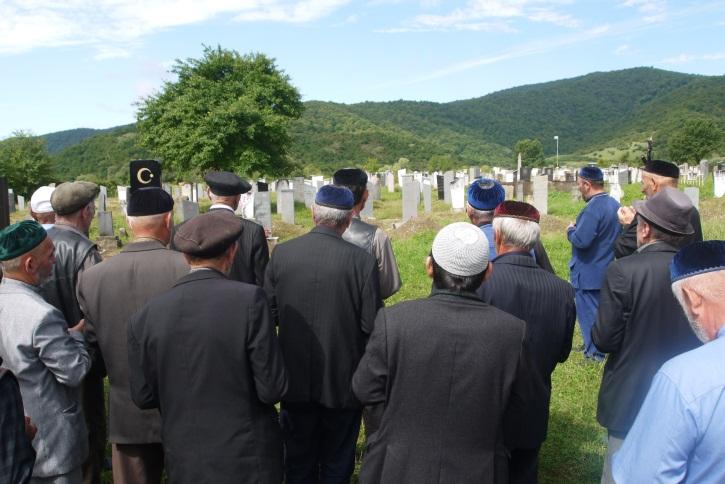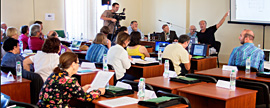Expedition of the IRCTP in Pankisi Proceeding from the demands of today’s ethnomusicology, it is impossible to research Georgian folk music without the consideration and study of neighbouring, particularly Caucasian cultures. Tbilisi State Conservatoire always had a close contact with northern Caucasus republics, especially in terms of the training of staff for them, although Georgia-Caucassian musical relationships were consistently researched only by few Georgian scientists (N. Maisuradze, M. Silakadze).
Development of research in that direction is one of the priorities of the Tbilisi State Conservatoire. This is why, on 3-16 August, 2013 The Research Center organized ethnomusicological expedition in Pankisi Gorge with the support of the Georgian Ministry of Culture and Monuments Protection.
The members of the expedition group were: Ketevan Baiashvili – the Center’s specialist, head of the expedition, Nino Razmadze – the Center’s specialist; Ilia Jgharkava – sound engineer; Giorgi Khutsishvili – cameraman and driver;
Expedition visited villages: Duisi, Jokolo, Omalo, Birkiani, Dumasturi, Kvareltskali, Dedispheruli, Qorety.
The Chechens – today’s inhabitants of the Pankisi Gorge together with the Ingush are called Vainakh (Nokhch in their mother tongue). Vainakh meaning “our people” in Chechen language. With this ethnonym they distinguish themselves from other Caucasian peoples. Both the Chechen and Ingush are autochthonous population in the Caucasus. Their mother tongue belongs to the Nakh group of the North Cucasian family of languages.
The Vainakhs first settled in Georgia in the 3rd century A.D. in the times of King Saurmag, the son of King Parnavaz. The Chechens (Kists-in Georgian) first settled in the Pankisi Gorge in the 18th -19th centuries.
Most of the migrant Chechens were the followers of “mountain religion” (synthesis of pagan and Christian beliefs). In 1886 many of them converted to Christianity thanks to the efforts of the Christian missionary society. Later this population accepted Islam parallel to 13 Christianity. According to Anania Japaridze (2012) this process lasted until the 1990s.
Today the Kists are the followers of Sunni Islam, from the last decade of the 20th century Vahabism (a sect of Islam) gained foothold in Pankisi, young generation rebukes the old for the lack of the knowledge of Arabic language and Koran.
As for Kist identity, in families they speak mother tongue. At school they get education in Georgian, and so everyone speaks Georgian. As ethnologist Valerain Itonishvili says they are bilingual people. The scholar mentions that the tradition of polygamy is weakened here; however the expedition materials have documented the complaints of several women against polygamy. As the followers of Islam they do not consume alcohol, middle-aged and elederly women smoke tobacco, but men smoke marijuana. Many families have moved to Grozni in search of work, but they maintain connection with the villages and the Gorge. They glorify their ancestors, interred in the Pankisi Gorge. In general the Kists are hospitable and benevolent people. They rear their children in the spirit of bravery and intrepidity. Enjoy horseriding. Horse is identified with their national identity. Neighboring villages are settled by Osetians, Acharians, Tsova-Tushetians and Phshavians. Generally they have well-intentioned relations among them.
As for musical life of Qists, they definitely belong to the family of carriers of the vocal polyphonic culture. Instrumental music is obviously in the shadow. Unfortunately the expedition was unable to find their traditional shaker instruments “Phkhatsich” or “Dechik phondur”. People still have the memory of those instruments, but even physically they could not be find not in a single family. As everywhere, Doli and Garmoni are common here too. The expedition recorded 1, 2, and 3 voiced songs. The type of polyphony here is mainly Burdonic. Very interesting forms are noticeable in their liturgical Ziqrs, research of which will show many interesting layers.
As it is menwioned, Pankisi gorge was settled by Osetians, Acharians, Tsova-Tushetians and Phshavians, along Chechens. Expedition got also interested in the topics of the musical integration, diffusion and assimilation and actiondistribution processes of conservation and innovations, among groups with differing ethnic origins.
Thus, it was very important to record musical examples of related branches. Also collected was oral (verses, stories, legends), historical, chorographical, ethnologic, religious material, as well as the examples of domestic, hunting, secular and sacred, mourning, work, magical, healing, pastoral and other genres at the possible extent. Also recorded were the unknown examples sung in the mill, for frightening evil spirits, sung by the women going to the forest, blessing of the men going to war, shepherd’s whistling without salamuri, at the end of Ramazan and mourning rituals.
Expedition has recorded 300 MGB of material, processing of which is currently underway at Tbilisi State Conservatoire International Research Center for Traditional Polyphony. Presentation of the expedition materials was held in the foyer of the Grand Hall of Tbilisi State Conservatoire on 16 October, 2013.






